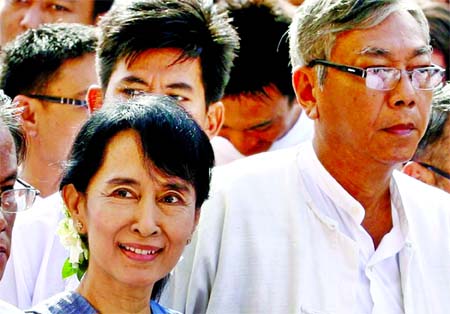
The Guardian :Aung San Suu Kyi won a great victory in November last year when her party swept the board in the general election, but Myanmar politics still resembles a tug of war between democratic forces and the military. The generals accepted the result and made noises about cooperation, but in the months since they have given very little away. This is the harsh background to the decision this week to put forward Htin Kyaw as the presidential candidate. He will be the surrogate for Aung San Suu Kyi because the military could not stand the loss of prestige involved in her becoming president. The vast majority of Myanmar’s people would have been in favour of discarding the clause, inserted into the constitution years ago specifically with her in mind, disqualifying a person with a spouse or children holding foreign citizenship from being president.The National League for Democracy, Aung San Suu Kyi’s party, tried to compromise with the military by suggesting that the contentious clause be suspended rather than dropped, and by offering them a range of posts in government. But they were not interested. The top soldier, commander-in-chief Min Aung Hlaing, apparently made it clear that suspension was unacceptable and that there would be immediate repercussions if the NLD tried to force the issue.The army could have demonstrated goodwill, but chose not to do so. The reasons for its obduracy are presumably that it saw a concession on this issue as a precedent for other compromises in the future which it would not wish to make. It may also have calculated that manoeuvring Aung San Suu Kyi into a position where she herself must act in an “unconstitutional” manner would weaken or discredit her. After all, the president in the Myanmar constitution is not supposed to play a secondary role to a political leader in the country’s lower house. But, assuming Htin Kyaw does become president – and there is no obvious way that can be prevented – the widespread assumption is that he will play only a ceremonial role and otherwise follow the strategy laid down by Aung San Suu Kyi. He is not an insubstantial figure, coming as he does from an old liberal family, and with a long relationship with Aung San Suu Kyi, both directly and through his wife Daw Su Su Lwin, an NLD MP. But he will have accepted his nomination on the basis that Aung San Suu Kyi will be president in all but name. Once he is in office, replacing the ex-general Thein Sein, who has been president since 2011 and who introduced some genuine reforms, the long period of transition since the November elections will be over.Aung San Suu Kyi will then be in charge of a real but far from all-powerful government. From their positions of control in several key ministries, in regional institutions, and in the economy, many in the military will resist any changes that they do not like. She will have to convince civil servants, in particular, that the future belongs to the NLD and not to the army, and reassure those of military background that there will be no reprisals or unjustified dismissals. Her aim will be to slowly shift military perceptions so that, in time, they will accept a reduced role in national affairs. This is a very tall order. On the way to filling it, if she can, she will have to earn a new kind of legitimacy, by meeting the expectations of Myanmar people for improvements of all kinds in their lives. She has been a heroine and a martyr; now she must become a builder.The military will not be an easy partner, likely to let her carry the can when things go wrong and to grab credit themselves when they go right. But even if the army proves to be less of a problem, her task is a huge one. Myanmar has not had a proper government for half a century. Almost everything that characterises a modern state – a professional civil service, a genuinely independent judiciary, representative institutions with real powers, an efficient business class, and, of course, civilian control of the military forces and the police – has been lacking. The ramshackle structure created by the army perpetuated its power and privileges, but was woefully bad at almost everything else. Setting it right, if it can be set right, will be the work of a generation.

